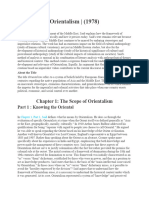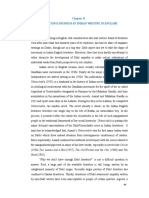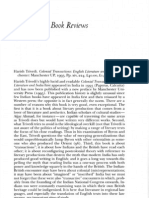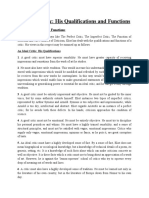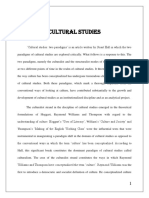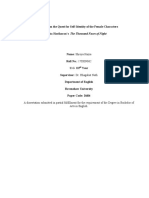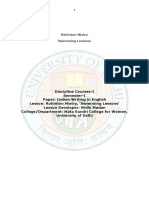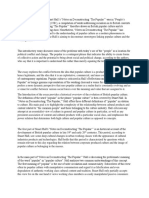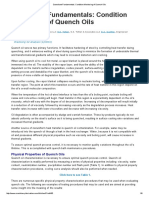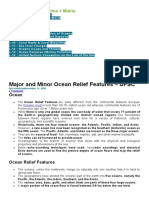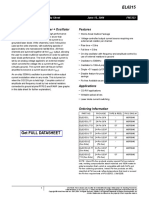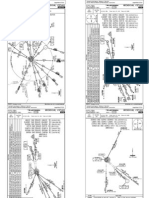Notes on Deconstructing the Popular Notes
Stuart Hall's "Notes on Deconstructing 'The Popular'" initially appeared in "People's History and
Socialist Theory" (1981) – a collection of essays concerned with socialism in its British contexts.
Therefore Hall's "Notes on Deconstructing 'The Popular'" relies on British popular culture and its
significance to the lower working class. But since Hall is attempting to deconstruct stereotypical
connections between popular culture and the working class, "Notes on Deconstructing 'The
Popular'" has theoretical value in relation to the understanding of popular culture as a modern
phenomenon in industrialized countries.
Stuart Hall's "Notes on Deconstructing 'The Popular'" works within the tension between the
perception of popular culture as something that emanates from the working class and therefore
has something authentic about it, and the understanding of popular culture as an exploitative,
commercial and mass communication based ally of modern capitalism. Hall's Notes on
Deconstructing 'The Popular'" criticizes views that regard popular culture as an authentic
expression of the working class and as a site for cultural resistance. Hall favors a more dynamic
approach which views popular culture as changing field and as a site for struggle between
different social forces over the meaning and value ascribed to popular culture.
"Notes on Deconstructing 'The Popular'" opens with an historical account of the development of
British Popular culture. Stuart Hall then proceeds to discuss the meaning of the term "popular" in
the phrase "popular culture". Hall is offering three different definitions of "popular" in relation to
culture, and his main point in "Notes on Deconstructing 'The Popular'" is to try and point to the
complexity of the relation between cultural products and content associated with "the common
people" and the products and content of the culture industry. Hall points to the power relation
that determine both high culture and popular culture as opposed concepts, while criticizing any
attempt for an essentialist view of culture in general and popular culture in particular, and any
steady association of content and cultural products with a specific social class.
The first part of Stuart Hall's "Notes on Deconstructing 'The Popular'" is an historical account of
the development of British popular culture in late 19th and early 20th centuries.
This period, according to Stuart Hall, saw some deep cultural changes in urban working classes
with the appearance of cultural industries products and technologies. Hall holds that this period
is characterized by questions which remain relevant to this day regarding the relation between
corporate produced culture and the image of popular culture as belonging to the masses.
In the main part of "Notes on Deconstructing 'The Popular'" Hall is discussing the problematic
meaning of the word "popular" in "popular culture". Hall analyzes two common understandings
of this concept. The first meaning of "popular" is the one of wide circulation and commerciality.
Subscribers of this view often tie popular culture with manipulative consumerism and regard it as
falsification and even degradation of authentic working class cultural content and tradition.
Stuart Hall only partially accepts this view for on the one hand it views working class members
as easily manipulated passive consumers while on the other hand seeking an "authentic" or
"original" working class culture which does not really exist. Hall prefers a more dynamic and
changing description of popular content and forms.
This study source was downloaded by 100000848989690 from CourseHero.com on 06-19-2022 01:34:44 GMT -05:00
https://www.coursehero.com/file/7584014/Notes-on-Deconstructing-the-Popular-Notes/
� The second definition of popular culture scrutinized by Hall is the one which views popular
culture as all the cultural activities of "the people". This definition is in fact a massive inventory
list of various cultural and leisure activities. Hall is critical of this perspective as well for its
essentialist view and it being based on the binary distinction between "the people" and the
"elite".
Towards the end of "Notes on Deconstructing 'The Popular'" Stuart Hall offers another definition
of popular culture which stresses its dynamic nature and constant tension and struggle. Hall
understands popular culture as an ongoing process, similar the concept of Hegemony offered by
Gramsci, is which relations of control and subordination are constantly shifting and certain
cultural forms gain and lose support from institutions. Preferred of marginalized cultural content
and forms are not fixed, according to Hall there is a constant movement and interchange between
them as a result of shifting power relations, the assimilation of poplar content into "high culture"
and vice versa. What Stuart Hall is essentially offering in "Notes on Deconstructing 'The
Popular'" is a neo-Gramscian view of the power relation between high and popular culture, with
a more mutual perspective of the assimilatory take originally offered by Gramsci who thought
the high hegemonic culture assimilates and sterilizes popular culture.
This study source was downloaded by 100000848989690 from CourseHero.com on 06-19-2022 01:34:44 GMT -05:00
https://www.coursehero.com/file/7584014/Notes-on-Deconstructing-the-Popular-Notes/
Powered by TCPDF (www.tcpdf.org)

